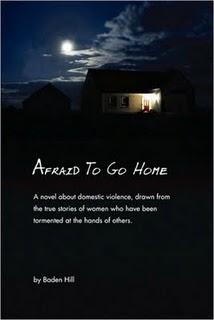Afraid to Go Home

Afraid to Go Home tells the story of Cathy, a successful career woman who is the head of a large company’s HR Department, but, after two failed marriages, trapped in an abusive relationship with Fred. The book’s subtitle reads: “A novel about domestic violence drawn from the true stories of women who have been tormented at the hands of others.” While the author may have researched domestic violence, Afraid to Go Home paints a picture that misses key points regarding the central dynamics of abusive relationships, and perpetuates victim-blaming stereotypes in its portrayal of the characters.
Cathy Circe (a not-so-subtle reference to the Greek goddess who lured Odysseus’ crew to their destruction) is a rape survivor whose inability to cope with the trauma prevented her from being with her high school sweetheart (and “love of her life”), Chris. She is presented as having been irrevocably damaged by the attack. While it is important to acknowledge sexual violence has life-altering consequences, what comes across in the depiction of her character is the myth that rape survivors are so injured that they cannot relate to men in a healthy way. Cathy is positioned as doomed to enter abusive relationships because she feels she deserves to be hurt, confuses abuse with love, is driven to re-live the trauma by engaging in risky behaviour, and is incapable of recognizing the danger of her situation—beliefs that place the responsibility for violence on those who are the victims of it instead of those are its perpetrators.
Fred is an openly aggressive man who is violent on a daily basis, controlling, and beats and rapes Cathy regularly. Though not initially clear in its victim blaming representation, Fred’s character is one-dimensionally evil, and the reader is given no insight into how the relationship progressed to that point. The poorly explained relationship invites the reader to question Cathy—why does an otherwise smart and successful woman marry and stay with such a monster?—instead of exposing the complicated dynamics of abusive relationships that often involve a subtle and gradual progression of various forms of violence mixed with apologies, loving charm, regret, and promises to never hurt again. Because we’ve never known Fred to be a nice guy, the reader concludes Cathy is so broken that she can’t even recognize, and thus flee from, pure evil.
There are many other similarly problematic characterizations: the overweight secretary who responds to her wedding being called off by sleeping with her boss (who only complies out of pity) and living as a crazy cat lady in a messy house and women repeatedly getting on their knees to reward a guy for doing the right thing.
In Afraid to Go Home’s 415 pages there was enough room to explore the complexities of domestic violence, as well as develop a plot and characters that could shed some light on how perpetrators manage to lure in, manipulate, and control their victims. Instead, the book invites victim blaming and is full of stereotypical female characters. While it is nice the author didn’t give in to the temptation of having Cathy rescued by a prince on a white horse at the end, Afraid to Go Home is one of those books that means well, but actually does more harm than good.
Interestingly, they are promoting the book by sending flyers about it to domestic abuse intervention programs around the country... thanks for the review!